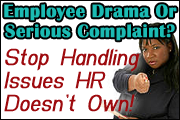| Course/Product Description | |||
| Title: | Serious Complaint Or Employee Drama? |
||
| SKU: | WT-1001476 | ||
| Format: | Webcast/Audio Conference/Interview/Podcast | ||
Description:

|
Why is that HR is the place employees go to "vent" about their issues? The reason is simple: HR tends to have better "people skills" and it's just easier to go to HR and have HR fight all the battles than it is to deal with the conflict directly. Unfortunately, the sheer number of employee issues that HR deals with on a daily basis is now bordering on the ridiculous, yet if you ask any HR Generalist or Manager today what their #1 frustration is, they'll likely tell you it's dealing with employee issues, many of which supervisors and managers should've owned! Let's face it: people issues can be messy and often require dealing head-on with conflict, so most people would just rather avoid it altogether. However, when employees and managers continually avoid the conflicts, and HR gets too involved, what results is an enabling behavior. Over time, word gets around that HR fights all the battles, so employees just keep on coming in to HR and, as a result, HR department productivity decreases, conflicts intensify, and already fragile relationships with supervisors and department heads become even more tenuous. Learning Objectives: In this informative audio conference, learn how to sift through all the employee drama to clearly identify legitimate employee relations' issues that need to be investigated - and which ones you should push back on or have your managers and supervisors handled themselves. Additionally, you'll learn strategies for creating boundaries in HR to minimize the flow of employee relations' complaints. Specifically:
About Your Speaker: Natalie Ivey is President and CEO of Results Performance Consulting, Inc., a firm specializing in leadership and employee development training and continuing education programs for the HR profession. Ms. Ivey is an author and a national public speaker with more than two decades of leadership and HR management experience with Fortune 500 organizations. She is a member of the Society for Human Resource Management and holds the Senior Professional in Human Resources certification (SPHR). Ms. Ivey is a nationally-known speaker on a variety of topics within the HR profession and is known for her "tell-it-like-it-is", direct approach to teaching HR education. Ms. Ivey routinely works with individuals, small businesses, and larger corporations to address destructive leadership behaviors and organizational dysfunction. She designs customized training programs to help employers correct poor behaviors, minimize legal exposure, and improve performance and profitability. HRCI Credits This program has been approved for 1.5 re-certification credit hours for HRCI's PHR and SPHR designations through the HR Certification Institute. For more information about certification or re-certification, please visit the HR Certification Institute website at www.hrci.org. The use of this seal is not an endorsement by HRCI of the quality of the program. It means that this program has met HRCIs criteria to be pre-approved for re-certification credit. SHRM Professional Development Credits This program is valid for 1.5 Professional Development Credits (PDCs) for the SHRM-CP or SHRM-SCP designations. For more information about certification or re-certification, please visit www.shrmcertification.org. |
||
| Licenses / Designations / Educational Credits: | PHR / SPHR Re-Certification Credits SHRM Certification Credits | ||
| About The Provider: | The Industry Calendar creates and sells webinars, audio conferences, and seminars for busy business professionals. For over ten years we've done the work of listing the important, don't-miss events in one convenient location so you can quickly and easily learn about key training topics that keep you up-to-date on trends and best practices, all while helping to keep you in compliance with the various rules and regulations affecting your organization. |
||
| Price: | $249.00 | ||
| More Info: | Contact Us For More Information | ||
| Share This: | Share on Facebook Share on Twitter |
||
| Currently Scheduled Dates For This Webcast | |||
| Course Title | Date | Price | |
| Serious Complaint Or Employee Drama? | CD/On-Demand | $249.00 | |